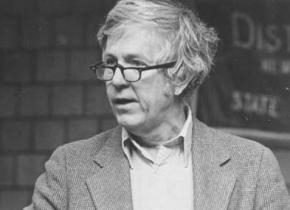What we can learn from Harrington
, founding editor of Jacobin magazine, replies to a comment from Socialist Worker's Joe Allen on the legacy of left-wing thinker Michael Harrington.
JOE ALLEN recounts a story from 1980s [in Allen's SocialistWorker.org commentary on an In These Times article written by Sunkara], in which he asks a question to Michael Harrington, only to be glibly dismissed as the "Trot in the room." That seems likely. Harrington engaged substantively with people like Peter Camejo, but his patience with those to his left often faltered. And not exactly uniquely--the history of the 20th century is littered with curmudgeonly radicals.
In this case, it's not clear what prompted the rudeness. From the account, it sounds like Harrington didn't know Allen personally beforehand. He was perhaps tipped off by the language he used, its mode of thought and style. There is no doubt that "Trots" can be singled out in a room full of leftists. And normally for good reasons: whatever its blemishes, American Trotskyism has been marked by rigor and seriousness, and record of being right on the major political questions of the 20th century.
So while I appreciate the comradely tone of Allen's response, it was disappointing to see it filled with inaccuracies and a lack of thoughtfulness. Billed as a substantive consideration, his piece is instead a polemic.

Allen claims that he was a "Harringtonite," but when he started college in the late 1970s, he quickly saw the error of his ways. He notes, correctly, that the posture adopted by Harrington and his co-thinkers--like Irving Howe, the founding editor of Dissent--towards the emerging New Left was unproductive. Tom Hayden and the other leaders of the young movement didn't fully grapple with the dynamics of Stalinism, but sniping from outside did those forces no good. It was an error that Harrington would later recognize and lament in the aftermath of the 1960s. That evolution happened even before Allen went to college.
Most blatantly wrong is Allen's mentions of Harrington's "support for the Vietnam War, long after even capitalist institutions like the New York Times came out against it." This didn't happen. Harrington never came out in favor of the Vietnam War--despite being handicapped by membership in an increasingly reactionary Socialist Party of America, he was a voice for peace in Vietnam from the very beginning.
This was Harrington's political failure. Being for "peace" in Vietnam, was not the same thing as calling for the victory of national liberation forces against imperialism. Harrington's reflexive anti-Stalinism served him poorly. He should have applied the original Shachtmanite distinction between "Stalinism in power" and "Stalinism in opposition"--the difference between Communist Party members fighting against racism in the Jim Crow South and Joseph Stalin in Russia--to the struggle of a flawed anti-imperialist force against the United States and more uncritically supported the Vietnamese resistance.
But whatever his politics there, at no point did Harrington ever embrace the United States' foreign wars. He remained firmly in the Third Camp tradition that Allen implies was somehow unique to the Trotskyist movement.
WHAT'S MORE, his labeling of Harrington as a "social democrat" is either a polemical device or reflects a frightening lack of clarity. Through his life, Harrington advocated not just for socialism within capitalism, but for socialism after capitalism--a break with class society and the bourgeois state. As someone who read The Twilight of Capitalism, Allen should know that Harrington even saw the welfare state as a "an ambiguous and transitional phenomenon, the temporary salvation of the system, but also the portent of its end." There is plenty to critique about the particularities of his vision, but it's not analytically useful to lump his perspectives with those of, say, Vermont Senator Bernie Sanders.
None of this is to act as lawyer for Harrington. My own political perspectives align better with more dynamic thinkers like England's Ralph Miliband. But if we keep in mind that for most of his life Harrington was writing in a specific historical context--one that featured a booming post-war capitalism, a labor movement strong enough to force a social democratic class compromise of sorts, and the existence of a bureaucratic collectivist Eastern Bloc--some value can be gleaned from his work.
As far as the substance of my piece, which Allen doesn't engage much with, it makes arguments and reflects an operative politics not at odds with those of Socialist Worker contributors. Our points of emphasis might differ, but that compatibility should be taken as a sign that the fissures of the 20th century should give way to renewed political practice in the 21st.


